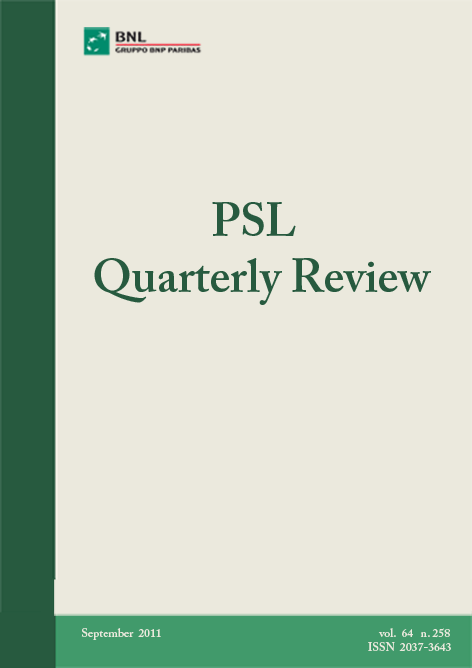Implications of regulating commodity derivatives markets in the USA and EU
DOI:
https://doi.org/10.13133/2037-3643/9413Keywords:
Finance, Commodities, FoodAbstract
The argument for effective financial regulation to curb financial activity and associated volatility in primary commodity markets is now more compelling than ever, in the context of the renewed increase in food prices. However, as in much other financial regulation, the devil is in the detail. This paper considers recent patterns in global food markets and discusses some of the implications of recent moves to regulate financial activity in commodity futures markets in the US and the EU. Specific regulatory issues are considered and alternative strategies are considered.
JEL Codes: F02, F14, G18, N50
References
BAFFES J. and HANIOTIS T. (2010), “Placing the 2006/08 commodity price boom into perspective”, World Bank Policy Research Working Paper, n. 5371, July 2010.
BÜYÜKŞAHIN B. and ROBE M.A. (2010), Speculators, commodities and cross-market linkages, mimeo, 28 November.
FOOD AND AGRICULTURE ORGANISATION (FAO) (2010), Crop prospects and food situation, Rome, December.
FOOD AND AGRICULTURE ORGANISATION (FAO) (2011), Price volatility and food security: a report by a High Level Panel of Experts on Food Security and Nutrition, Rome.
CHANDRASEKHAR C.P. and GHOSH J. (2011), “The transmission of global food prices”, mimeo.
GHOSH J. (2010), “Unnatural coupling: food and global finance”, Journal of Agrarian Change, January, pp. 72-86.
GILBERT C.L. (2010), “Speculative influences on commodity futures prices 2006-2008”, UNCTAD Discussion Paper, n. 197, March 2010.
GILBERT C.L. (2010), “How to understand high food prices”, Journal of Agricultural Economics, vol. 61, pp. 398-425.
HERNANDEZ M. and TORERO M. (2010), “Examining the dynamic relationship between spot and future prices of agricultural commodities”, IFPRI Discussion Paper, n. 00988, Washington (DC): International Food Policy Research Institute.
IRWIN S.H. and SANDERS D.R. (2010), “The impact of index and swap funds on commodity markets”, OECD Food, Agriculture, and Fisheries Working Papers, n. 27.
MAYER J. (2009), “The growing interdependence between financial and commodity markets”, UNCTAD Discussion Paper, n. 195.
MAYER J. (2011), “The growing financialization of commodity markets: an empirical investigation”, mimeo, Geneva: UNCTAD.
RAFFER K. (2008) “A food import compensation mechanism: a modest proposal to reduce food price effects on poor countries”, paper presented at the G24 Technical Group Meeting, September 8-9, United Nations, Geneva.
ROBLES M., TORERO M. and VON BRAUN J. (2009), “When speculation matters”, IFPRI Policy Brief, n. 57, Washington (DC): International Food Policy Research Institute.
RONCAGLIA A. (2003), “Energy and market power: an alternative approach to the economics of oil”, Journal of Post Keynesian Economics, vol. 25, n. 4, pp. 641-659.
TANG K. and XIONG W. (2010), “Index investment and financialization of commodities”, NBER Working Paper, n. 16385, Cambridge (MA): National Bureau of Economic Research.
UNITED NATIONS CONFERENCE ON TRADE AND DEVELOPMENT (UNCTAD) (2009), Trade and development report 2009, Geneva: United Nations.
UNITED NATIONS CONFERENCE ON TRADE AND DEVELOPMENT (UNCTAD) (2011), Trade and development report 2011, Geneva: United Nations.
UN-DESA (2010), World economic and social prospects 2010, New York: United Nations Organization.
Downloads
Published
How to Cite
Issue
Section
License



